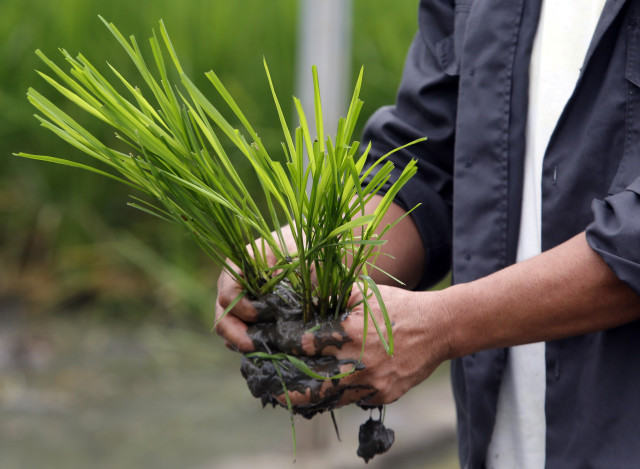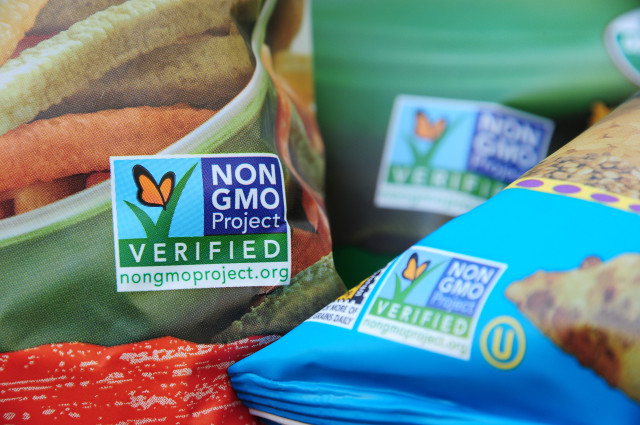
An agriculturist prepares to plant “Golden Rice” seedlings, grown from genetically-modified rice grains, at the International Rice Research Institute in Los Banos, south of Manila in the Philippines, Aug. 14, 2013. (Reuters)
Proponents and critics of genetic modification (GM) have been arguing over the potential impact of genetically modified organisms (GMO) on health and the environment for more than a decade now.
Genetic engineering can manipulate the DNA of crops to switch off existing traits or add new ones in ways that were not possible before.
Proponents argue that genetic engineering has been at work long enough without reports of health or environmental risks. They say the process undergoes rigorous testing and is more precise and more sustainable.
Opponents say the biotech industry’s safety tests are self-motivated and lack oversight. They argue that in addition to concerns over long-term health issues, the environmental impact of GM farming is already evident.
TECHtonics reached out to two experts from each side of the debate to get a glimpse of where some of these issues stand today.
C.S. Prakash, Professor of Plant Molecular Genetics at Tuskegee University
The argument that genetically modified crops release escaped genes into the environment or that they cause allergies are concerns that are, in his view, “orchestrated and made up,” says Prakash.
He says pollination and cross-pollination is always going on and has not prevented people from growing food crops for thousands of years and maintaining the purity of crop varieties.
There are “no side effects to genetically modified crops,” says Prakash, and no increase in allergens because of GM crops.
“It’s the other way round,” he added. “We have a technology where in the future, we can [grow] allergen-free plants, allergen-free food, or we have the technology where we can come up with sensors to identify food contamination and food poisoning and allergy. And so I don’t think there is any scientific basis for either of these.”
He says the biotech industry does “rigorous testing” for food safety and environmental impact and will “make sure that any crop, commodity that is introduced into the market goes through substantial testing and that there is not going to be any known side-effects in terms of its nutritional quality being compromised or any new undesirable traits being introduced into our food. We clearly don’t want that.”
“The risk of any product – food product, or any product – is inherent in the product and not in the process in which it was developed,” he said. “And so, many scientific bodies and organizations that have looked at biotechnology have said that … inherently, there is nothing dangerous about it.”
Biotech, argues Prakash, has “far more answers and far more ways to answer about the consequences of food developed from GM technology compared to conventional.”
With conventional breeding, he says “we absolutely had no idea what we were doing and what were the consequences of that. And yet we went ahead.”
Nevertheless, going conventional or GM is a matter of preference – and precision, says Prakash.
“If you want something that is much more knowledge-based and science-based, and something that is more direct and straightforward, then you go for genetic modification,” he said. “But it also brings in a lot more expense, a lot of regulation, and of course, in some countries right now, GM crops are not allowed.”

Labels on bags of snack foods indicate they are non-GMO products, Los Angeles, California, Oct. 19, 2012. (AFP)
What about the nutrition label?
The biotech industry, according to Prakash, is not opposed to voluntary labeling of GMOs. But he argues that food is not typically labeled based on how it was grown, but rather on its nutritional content.
He also suggests that labeling might antagonize consumers or give the impression that there is something dangerous about the product. He argues that labeling leaves consumers without a choice and puts “hurdles in the development of the technology for absolutely no reason.”
Ricardo Salvador, Director of the Union of Concerned Scientists
Do you act with precaution and do studies first? Or do you use the new technology until there is reason to suspect that there is some unexpected consequence?
At the heart of these questions is what Salvador calls the philosophical difference that comes into play when evaluating the safety of biotech.
He says it is natural to ask questions about the consequences of a technology that is still novel in that the “recombination of genes by introducing foreign genes intentionally into agricultural organisms is not something that we’ve done in this way before.”
He says a little more than a decade and a half of this type of research, biotech now has a track record.
“And the … issue that concerns us the most is the environmental impact that results from the fact that this is a technology that enables and accelerates intensive agriculture, and particularly the kind of agriculture that generates a lot of environmental damage,” he said.
With GM farming, Salvador says more acres can be planted in a shorter period of time. The high cost of the seed motivates farmers to apply as much nitrogen fertilizer as possible to promote productivity and make rapid passes over the field with machinery, thereby baring the soil because weeds have been controlled chemically.
What follows, says Salvador, is water pollution due to the over-application of fertilizers, soil erosion, sedimentation of public waterways, and high cost to the public. That puts GM technology “in the midst of catastrophic failure” for not delivering on its promise to give “greener, cleaner, more sustainable agriculture,” said Salvador.
Current applications making crops herbicide-resistant and insecticide-resistant or producing their own insecticide have resulted in a “rapid adaptation of both weeds and insects,” he said.
“Now the technology is ineffective,” he continued. “Farmers don’t really know another way by now to control weeds. And in fact the resistant weeds are very difficult to control with almost any alternative method.”
While agriculture might have faced similar issues before 1994, when genetic modification took off, Salvador argues that they were not “expressed to the degree that we now face, nor did these issues develop as quickly as they now have developed with this technology.”
While he argues that molecular biology should be pursued to enhance human knowledge, he is concerned about “turning science into technology and then the business models that are utilized to put this technology into the agricultural system.”
The costs – the feed, the fertilizer, the machinery, the fuel cost, the environmental costs, come down to what he describes as the “health epidemic that results from the fact that your producing too much of the wrong stuff – corn, soy – these are ingredients for the junk food diet which is making wealthy societies sick.”
Salvador argues that the GM business model of selling farmers something each year makes them “dependent upon a technology, upon an input,” which is “antithetical to the sustainability and the self-determination of farmers.”
The current system, which is supported by direct public investment “would get greater returns on its investment if it had a less damaging system to … ecology, as well as to health,” he said.
He urges policymakers to review resource allocation and to “make sure that the public gets the highest return.”



